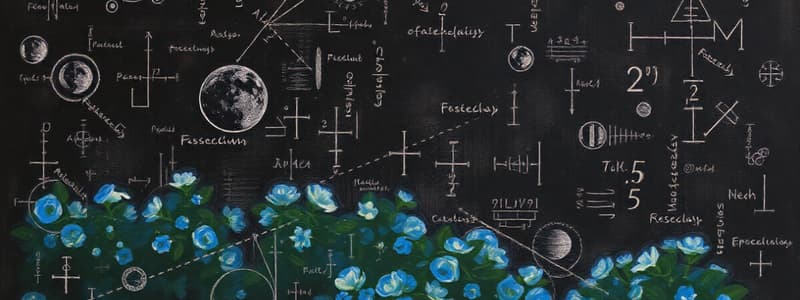Podcast
Questions and Answers
What does algebra primarily focus on?
What does algebra primarily focus on?
- Basic arithmetic operations
- The rules for manipulating symbols (correct)
- The study of shapes and sizes
- The analysis of data
Which branch of mathematics involves the study of rates of change?
Which branch of mathematics involves the study of rates of change?
- Arithmetic
- Statistics
- Calculus (correct)
- Geometry
What are sets in mathematical terms?
What are sets in mathematical terms?
- Individual elements with defined properties
- A type of mathematical operation
- A collection of numbers in a sequence
- Collections of objects (correct)
Which mathematical operation is NOT included in basic arithmetic operations?
Which mathematical operation is NOT included in basic arithmetic operations?
What type of number is characterized by having a decimal expansion that does not terminate or repeat?
What type of number is characterized by having a decimal expansion that does not terminate or repeat?
What does probability measure?
What does probability measure?
Which of the following best describes functions in mathematics?
Which of the following best describes functions in mathematics?
What technique is used to demonstrate the truth of statements or theorems in mathematics?
What technique is used to demonstrate the truth of statements or theorems in mathematics?
Which area of mathematics focuses on distinct and countable objects?
Which area of mathematics focuses on distinct and countable objects?
What is a primary use of mathematics in engineering?
What is a primary use of mathematics in engineering?
Which mathematical concept involves the study of limits and differentiation?
Which mathematical concept involves the study of limits and differentiation?
What strategy involves clearly defining the problem statement?
What strategy involves clearly defining the problem statement?
What was a significant turning point in understanding continuous change in mathematics?
What was a significant turning point in understanding continuous change in mathematics?
Flashcards
Arithmetic
Arithmetic
Basic math operations (addition, subtraction, multiplication, division) on numbers.
Algebra
Algebra
Math using symbols and rules to solve problems with unknown quantities.
Geometry
Geometry
Study of shapes, sizes, positions in space, covering lines, angles, polygons and circles.
Calculus
Calculus
Signup and view all the flashcards
Sets
Sets
Signup and view all the flashcards
Functions
Functions
Signup and view all the flashcards
Equations
Equations
Signup and view all the flashcards
Probability
Probability
Signup and view all the flashcards
Prime Numbers
Prime Numbers
Signup and view all the flashcards
Divisibility
Divisibility
Signup and view all the flashcards
Mathematical Problem Solving
Mathematical Problem Solving
Signup and view all the flashcards
Discrete Mathematics
Discrete Mathematics
Signup and view all the flashcards
Study Notes
Branches of Mathematics
- Arithmetic: Focuses on basic operations like addition, subtraction, multiplication, and division of numbers.
- Algebra: Deals with symbols and the rules for manipulating them to solve problems. It extends arithmetic by using variables to represent unknown quantities.
- Geometry: Studies shapes, sizes, and positions of objects in space. Includes concepts like lines, angles, polygons, and circles.
- Calculus: Deals with continuous change, particularly involving rates of change and accumulation. Includes differential calculus (derivatives) and integral calculus (integrals).
- Statistics: The collection, analysis, interpretation, presentation, and organization of data.
- Probability: The measure of the likelihood of an event occurring. It quantifies uncertainty.
Fundamental Concepts in Mathematics
- Sets: Collections of objects. Various types of sets exist, including finite and infinite sets. Operations like union, intersection, and complement are defined.
- Numbers: Different types of numbers are studied such as natural numbers, integers, rational numbers, irrational numbers, real numbers, and complex numbers. Each type has unique properties.
- Functions: A relation between a set of inputs and a set of possible outputs where each input is related to exactly one output. Different types of functions exist.
- Logic: Formal systems of reasoning, including propositions, connectives, quantifiers, and arguments. Crucial for rigorous mathematical arguments and proofs.
- Proof Techniques: Methods used to demonstrate the truth of statements or theorems.
Key Mathematical Operations and Principles
- Basic Arithmetic Operations: Addition, subtraction, multiplication, and division.
- Order of Operations (PEMDAS/BODMAS): A set of rules defining the order in which calculations are performed.
- Equations and Inequalities: Statements involving variables or unknown quantities, often solved to find their values.
- Systems of Equations: Multiple equations with multiple variables that may be solved simultaneously.
Mathematical Tools and Applications
- Graphs and Diagrams: Visual representations used to illustrate data and relationships between variables.
- Mathematical Models: Simplified representations of real-world phenomena to make complex problems easier to understand.
- Algorithms: Step-by-step procedures for solving problems.
Branches of Advanced Mathematics
- Number Theory: Studies the properties of numbers, particularly integers. Topics include prime numbers, divisibility, and modular arithmetic.
- Analysis: Studies concepts like limits, continuity, differentiation, and integration of functions.
- Linear Algebra: Deals with linear equations, matrices, and vector spaces.
- Topology: Studies shapes and their properties through continuous deformations.
- Discrete Mathematics: Deals with objects that are distinct and countable, rather than continuous.
Applications of Mathematics in Different Fields
- Science: Used to model physical phenomena, make predictions, and analyze data.
- Engineering: Used for design, construction, and problem-solving.
- Finance: Used for investment analysis, risk management, and financial modeling.
- Computer Science: Used for algorithm design, data structures, and computer graphics.
Problem-Solving Strategies in Mathematics
- Understanding the problem statement: Clearly defining the given information and what is required.
- Identifying key relationships: Connecting the given information to the desired outcome.
- Developing a strategy: Planning the approach to solve the problem.
- Implementing the strategy: Carrying out the chosen solution.
- Evaluating the solution: Checking if the answer makes sense and is consistent with the problem.
Historical Development of Mathematics
- Ancient civilizations made significant contributions, laying the foundation for much of modern mathematics.
- Ancient Greek mathematics saw major development in geometry and number theory.
- The invention of calculus marked a turning point in understanding continuous change.
Mathematical Notation and Symbols
- Standard notation for numbers, variables, operations, and functions.
- Understanding different symbols, including mathematical operators and special characters.
Studying That Suits You
Use AI to generate personalized quizzes and flashcards to suit your learning preferences.




